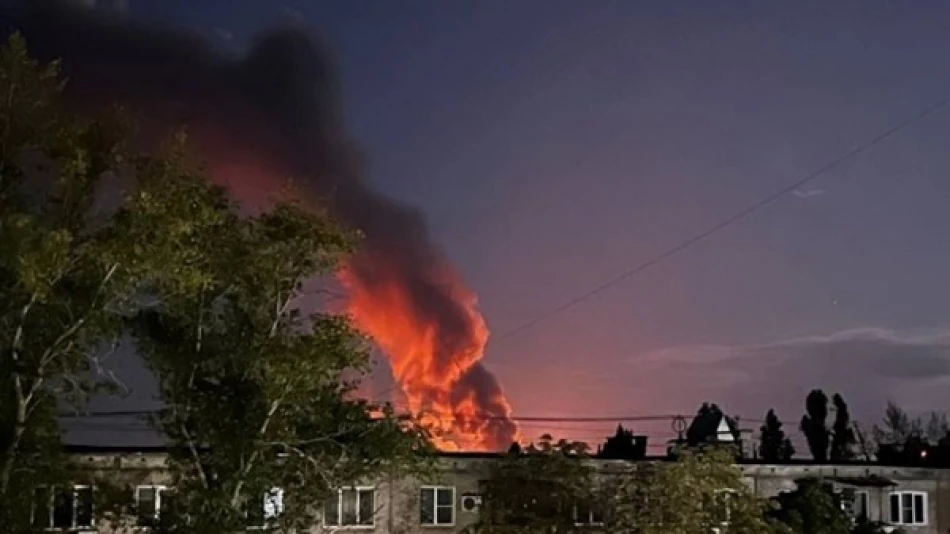
Ukraine Strikes Two Russian Oil Refineries in Daring Cross-Border Attack
Ukraine Strikes Deep: Drone Attacks on Russian Oil Refineries Signal Escalation in Economic Warfare
Ukrainian forces have successfully targeted two oil refineries deep inside Russian territory using long-range drone strikes, marking a significant escalation in Ukraine's campaign to disrupt Russia's energy infrastructure. The attacks, reaching as far as 2,000 kilometers from the front lines, demonstrate Ukraine's growing capability to strike critical economic assets at the heart of Russia's war machine.
Coordinated Strikes Across Vast Distances
The Ukrainian military confirmed on Sunday that its drone operations hit two separate oil facilities in what appears to be a coordinated assault on Russia's energy sector. The first target was a major refinery in the Saratov region of western Russia, where regional governor Roman Busargin acknowledged damage to an "industrial facility" and confirmed one fatality from the drone attack.
The second strike reached even deeper into Russian territory, hitting a refinery in the remote northern city of Ukhta in the Komi Republic. This facility sits approximately 2,000 kilometers (1,200 miles) from the front lines, showcasing Ukraine's expanding operational reach. While the Komi governor confirmed a drone attack via his Telegram channel, he did not specifically mention the Ukhta refinery and denied any casualties from the strike.
Strategic Targeting of Russia's Economic Lifeline
These attacks represent more than tactical strikes—they constitute a deliberate strategy to undermine Russia's economic capacity to sustain its military operations. Oil refineries are particularly valuable targets because they process crude oil into the refined products that fuel military vehicles, generate export revenue, and power civilian infrastructure.
Economic Warfare Through Energy Infrastructure
Ukraine's focus on energy facilities mirrors successful wartime strategies used throughout modern conflicts, where disrupting an adversary's economic base proves as effective as battlefield victories. By targeting refineries rather than crude production facilities, Ukraine maximizes economic disruption while potentially limiting environmental damage—refined product facilities are typically easier to repair than extraction operations.
The Saratov region refinery, in particular, represents a significant economic asset. Western Russia's industrial facilities have largely remained untouched throughout the conflict, making this strike psychologically impactful for Russian leadership and citizens who may have felt insulated from the war's direct effects.
Technological Leap in Ukrainian Capabilities
The successful strikes demonstrate a remarkable evolution in Ukraine's military technology and operational planning. Reaching targets 2,000 kilometers from the front lines requires sophisticated navigation systems, extended flight capabilities, and precise intelligence gathering—capabilities that Ukraine has developed rapidly since the conflict's early stages.
Implications for Future Operations
If Ukraine can consistently strike targets at such distances, virtually no Russian economic infrastructure remains safe. This capability shift fundamentally alters the strategic calculus for both sides, potentially forcing Russia to dedicate significant air defense resources to protecting industrial facilities far from the front lines.
Broader Context of Cross-Border Violence
The refinery strikes occurred alongside continued violence in border regions, with the governor of Russia's Belgorod region reporting the death of a woman in an area that frequently experiences Ukrainian fire due to its proximity to active combat zones. This pattern of border violence has become routine, but the deep-strike capability represents a qualitative change in the conflict's scope.
Market and Geopolitical Ramifications
For global energy markets, these strikes signal that Russia's domestic refining capacity faces ongoing threats, potentially affecting both domestic fuel supplies and export capabilities. While immediate market impact may be limited, consistent targeting of such facilities could gradually pressure Russian energy revenues and domestic fuel availability.
The attacks also demonstrate to international observers that Ukraine possesses increasingly sophisticated military capabilities, potentially influencing future defense cooperation and technology sharing agreements with allied nations.
Most Viewed News

 Layla Al Mansoori
Layla Al Mansoori






